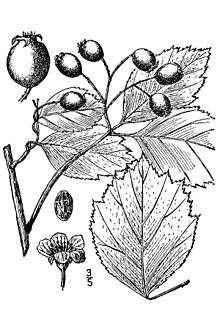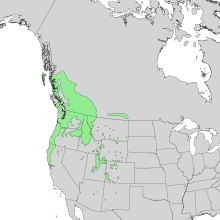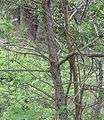Crataegus douglasii
Crataegus douglasii is a North American species of hawthorn known by the common names black hawthorn and Douglas' thornapple. It is named after David Douglas, who collected seed from the plant during his botanical explorations.[5]
| Crataegus douglasii | |
|---|---|
 | |
| Scientific classification | |
| Kingdom: | |
| (unranked): | |
| (unranked): | |
| (unranked): | |
| Order: | |
| Family: | |
| Genus: | |
| Section: | Douglasia |
| Series: | Douglasianae |
| Species: | C. douglasii |
| Binomial name | |
| Crataegus douglasii | |
 | |
| Natural range of Crataegus douglasii | |
| Synonyms | |
|
C. brockwayae Sarg.[3] | |
This thorny shrub is native to northern and western North America, where it grows in varied habitats from forest to scrubland. It is most abundant in the Pacific Northwest.
Description
Crataegus douglasii is a compact erect bushy shrub covered in fan-shaped green leaves with teeth along the distal margin. Thorns along the branches are one to two centimeters long.
White flowers with greenish centers grow in bunches at the ends of each thin branch. The fruit is a very dark purple pome up to about a centimeter across. The fruits were a good food source for Native American peoples such as the Cheyenne and Nlaka'pamux.
Ecology
The foliage is browsed by cattle and sheep, and various birds, including quail, the Hungarian partridge, and ring-necked pheasant, feed on the berries.[5][6] It is a larval host to the gray hairstreak, mourning cloak, pale tiger swallowtail, and western tiger swallowtail.[7]
Formerly placed within this species
- Crataegus douglasii var. duchesnensis is now considered to be a synonym of Crataegus saligna.
Images
- Straight, stout thorns are one to two centimeters long.[8]
- The white flowers have greenish centers.
- Crataegus douglasii
- The leaf margin is toothed and usually slightly lobed.
.jpg) Crataegus douglasii leaves changing color in fall.
Crataegus douglasii leaves changing color in fall. The mature bark is grey and rough.[9]
The mature bark is grey and rough.[9]

 Crataegus douglasii
Crataegus douglasii.jpg) Crataegus douglasii JEPS109866 (4496863581)
Crataegus douglasii JEPS109866 (4496863581)
References
| Wikimedia Commons has media related to Crataegus douglasii. |
- Phipps, J.B.; O'Kennon, R.J.; Lance, R.W. (2003). Hawthorns and medlars. Cambridge, U.K.: Royal Horticultural Society. ISBN 0881925918.
- TROPICOS entry for series Douglasianae
- Kruschke, E.P. (1965). "Contributions to the taxonomy of Crataegus". Milwaukee Public Museum Publications in Botany. 3: 11–273.
- Phipps, J.B. (1995). "The identity of Crataegus columbiana and its relationship to C. piperi (Rosaceae)". Taxon. 44 (3): 405–8. JSTOR 1223414.
- Whitney, Stephen (1985). Western Forests (The Audubon Society Nature Guides). New York: Knopf. p. 392. ISBN 0-394-73127-1.
- Peattie, Donald Culross (1953). A Natural History of Western Trees. New York: Bonanza Books. p. 519.
- The Xerces Society (2016), Gardening for Butterflies: How You Can Attract and Protect Beautiful, Beneficial Insects, Timber Press.
- "Crataegus douglasii". WTU Herbarium Image Collection. Burke Museum, University of Washington. Retrieved 2009-12-12.
- Pojar, Jim; Andy MacKinnon (1994). Plants of the Pacific Northwest. Lone Pine. p. 73. ISBN 1-55105-042-0.
External links
- Jepson Manual Treatment - Crataegus douglasii
- U.Mich: Ethnobotany
- Crataegus douglasii - Photo gallery